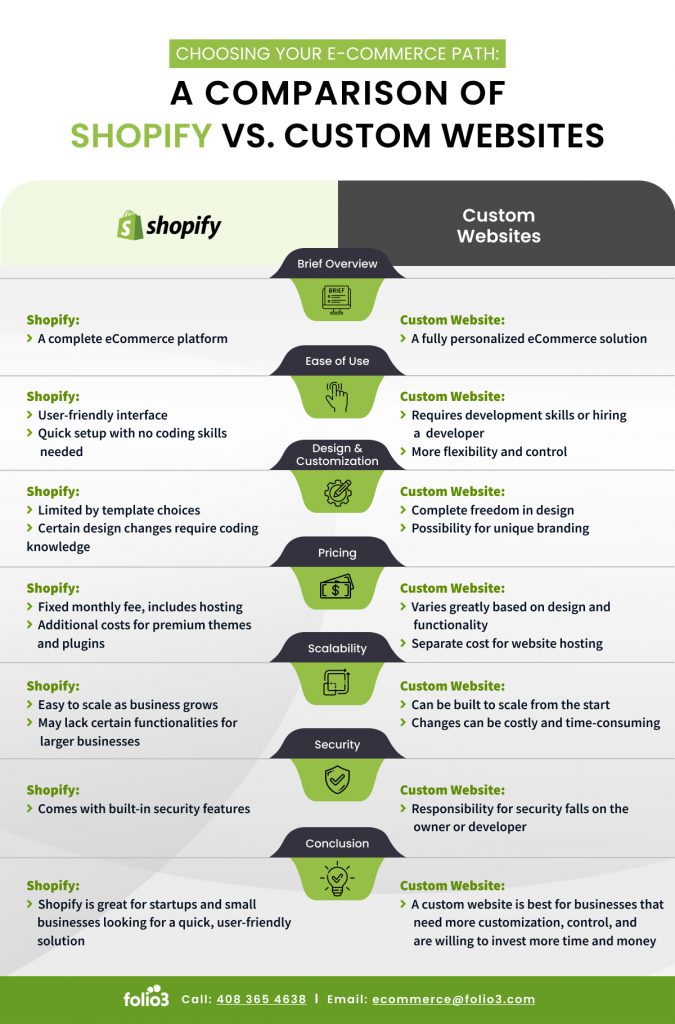Shopify vs Custom Website: Which One to Invest in 2024?
Last Updated | July 26, 2024
Table of Contents
Choosing between Shopify and building your own website can be tough. Both have unique benefits and drawbacks. In this guide, we’ll compare these options to help you decide which one is best for your business in 2024.
Shopify vs Own Website Key Differences
Ease of Use: Shopify is user-friendly and requires no coding skills. A custom website offers more flexibility but needs technical knowledge.
Cost: Shopify has fixed monthly fees. Building your own site can be more expensive upfront but might save costs in the long run.
Customization: Shopify offers many templates, but custom websites provide unlimited design possibilities.
Maintenance: Shopify handles updates and security. With your own website, you’re responsible for ongoing maintenance.
Comparison: Online Shopify Store vs eCommerce Custom Website
Shopify Store
- Pros: Quick setup, 24/7 support, integrated payment options, scalable plans.
- Cons: Monthly fees, less control over customization, dependent on Shopify’s infrastructure.
Custom eCommerce Website
- Pros: Full control over design and functionality, no monthly fees after setup, flexibility to integrate any tool or feature.
- Cons: Higher initial cost, requires technical skills or hiring a developer, ongoing maintenance responsibilities.
Shopify vs Custom Website: Functionality
Shopify is a user-friendly eCommerce platform ideal for beginners and experts alike. It provides ready-made solutions and options, making it easy to set up an online store. Even if you’re unsure where to start, Shopify offers guidance and pre-set choices to help you. For those who aren’t tech-savvy, hiring a freelancer to manage the store is a straightforward option.
Custom Websites require building from scratch, meaning you must know exactly what you want and understand various features and tools. This can be challenging for beginners. Without clear instructions, even experienced designers may struggle to meet expectations.
Ease of Use: Shopify is designed for everyone, from novices to eCommerce experts. Setting up an account and configuring your store is quick and simple. In contrast, custom websites demand extensive knowledge in coding, web development, and hosting services, often requiring professional help.
Setup and Management: Shopify’s dashboard is intuitive, showing clear steps to add a domain, customize themes, and upload products. Custom websites need a web developer and separate services like hosting and domain registration, making the setup process more complex and time-consuming.
Design
Shopify offers convenient, pre-designed themes that are attractive and responsive. Users select the themes that best fit their business needs.
Custom Websites allow for unlimited customization, enabling owners to design their sites exactly as they envision. This flexibility supports growth and adaptability but requires more effort and expertise.
Themes
Shopify provides 73 pre-designed themes, including free and paid options ($140-$180), perfect for quick starts.
Custom Websites demand creativity to design unique themes from scratch. This is great for professionals but challenging for beginners and often more expensive.
Development Time
Shopify enables fast store setup, with minimal downtime depending on how quickly you choose a theme and upload products. Custom websites take longer to develop and start functioning, requiring detailed attention to each step.
Features
Shopify includes built-in features like fraud analysis, payment gateways, and product management. Folio3 Shopify Maintenance Services can help maintain these features.
Custom Websites need individual tools and features integrated, often at additional costs, making this process both expensive and time-consuming.
Payment Gateways and Fees
Shopify has its own payment system and supports major gateways like PayPal, Apple Pay, and Stripe. Using non-Shopify payment providers incurs small fees.
Custom Websites require manually integrating preferred payment gateways, which can be costly and complicated.
Budget and Pricing
Shopify has tiered pricing plans:
- Shopify Lite: $9/month
- Basic Shopify: $29/month
- Shopify: $79/month
- Advanced Shopify: $299/month
Custom Websites involve one-time costs for hosting, payment gateways, staff accounts, and customizations, which can be very expensive.
Marketing Tools
Shopify offers a variety of built-in marketing tools, from discount applications to customer engagement features.
Custom Websites require third-party marketing tools, needing careful selection and integration, which can be hit or miss.
SEO
Shopify provides built-in SEO benefits, ensuring stores are optimized for search engines.
Custom Websites need manual SEO setup to ensure visibility on search engines, requiring more effort and expertise.
Dropshipping
Shopify supports easy shipping options and drop-shipping features, allowing clients to sell products without maintaining inventory.
Custom Websites need to set up shipping and drop-shipping arrangements independently, which can be complex and costly.
Customer Support
Shopify offers 24/7 customer and technical support via various communication methods, along with tutorials and community forums.
Custom Websites rely on self-research and resources like Google, YouTube tutorials, and forums, lacking dedicated support.
Integration
Shopify has its own app store and supports third-party integrations, simplifying the process.
Custom Websites require thorough research to ensure secure and effective integrations, often lacking a centralized app store.
Sales Features
Shopify includes built-in sales features like abandoned cart recovery, shipping price calculations, and buyer identification.
Custom Websites need to source and integrate these features externally, increasing complexity and cost.
Inventory Management
Shopify handles inventory management automatically, alerting users about stock levels.
Custom Websites require separate inventory management tools, which need to be integrated and maintained.
Mobile Responsiveness
Shopify themes are mobile responsive and come with a mobile app for easy access.
Custom Websites may struggle with mobile responsiveness, requiring careful selection of themes and potentially additional investment in a mobile app.
Application Integrations
Shopify supports a range of app integrations and social media connections, offering a comprehensive eCommerce solution.
Custom Websites need careful selection and integration of third-party apps, with a risk of inefficiencies.








